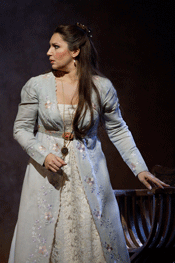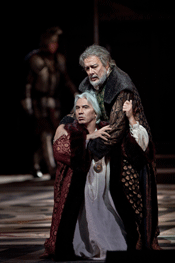![Dmitri Hvorostovsky as Simon Boccanegra [Photo by Marty Sohl courtesy of The Metropolitan Opera]](http://www.operatoday.com/BOCCANEGRA_Hvorostovsky_as_.gif)
01 Feb 2011
Simon Boccanegra, New York
A few years ago, a certain major newspaper boasted a music critic who could not bring himself either to take opera seriously or to deny himself the opportunity to review it.
English Touring Opera are delighted to announce a season of lyric monodramas to tour nationally from October to December. The season features music for solo singer and piano by Argento, Britten, Tippett and Shostakovich with a bold and inventive approach to making opera during social distancing.
This tenth of ten Live from London concerts was in fact a recorded live performance from California. It was no less enjoyable for that, and it was also uplifting to learn that this wasn’t in fact the ‘last’ LfL event that we will be able to enjoy, courtesy of VOCES8 and their fellow vocal ensembles (more below …).
Ever since Wigmore Hall announced their superb series of autumn concerts, all streamed live and available free of charge, I’d been looking forward to this song recital by Ian Bostridge and Imogen Cooper.
Although Stile Antico’s programme article for their Live from London recital introduced their selection from the many treasures of the English Renaissance in the context of the theological debates and upheavals of the Tudor and Elizabethan years, their performance was more evocative of private chamber music than of public liturgy.
Evidently, face masks don’t stifle appreciative “Bravo!”s. And, reducing audience numbers doesn’t lower the volume of such acclamations. For, the audience at Wigmore Hall gave soprano Elizabeth Llewellyn and pianist Simon Lepper a greatly deserved warm reception and hearty response following this lunchtime recital of late-Romantic song.
For this week’s Live from London vocal recital we moved from the home of VOCES8, St Anne and St Agnes in the City of London, to Kings Place, where The Sixteen - who have been associate artists at the venue for some time - presented a programme of music and words bound together by the theme of ‘reflection’.
'Such is your divine Disposation that both you excellently understand, and royally entertaine the Exercise of Musicke.’
‘And there was war in heaven: Michael and his angels fought against the dragon; and the dragon fought and his angels, And prevailed not; neither was their place found any more in heaven … that old serpent … Satan, which deceiveth the whole world: he was cast out into the earth, and his angels were cast out with him.’
There was never any doubt that the fifth of the twelve Met Stars Live in Concert broadcasts was going to be a palpably intense and vivid event, as well as a musically stunning and theatrically enervating experience.
‘Love’ was the theme for this Live from London performance by Apollo5. Given the complexity and diversity of that human emotion, and Apollo5’s reputation for versatility and diverse repertoire, ranging from Renaissance choral music to jazz, from contemporary classical works to popular song, it was no surprise that their programme spanned 500 years and several musical styles.
The Academy of St Martin in the Fields have titled their autumn series of eight concerts - which are taking place at 5pm and 7.30pm on two Saturdays each month at their home venue in Trafalgar Square, and being filmed for streaming the following Thursday - ‘re:connect’.
The London Symphony Orchestra opened their Autumn 2020 season with a homage to Oliver Knussen, who died at the age of 66 in July 2018. The programme traced a national musical lineage through the twentieth century, from Britten to Knussen, on to Mark-Anthony Turnage, and entwining the LSO and Rattle too.
With the Live from London digital vocal festival entering the second half of the series, the festival’s host, VOCES8, returned to their home at St Annes and St Agnes in the City of London to present a sequence of ‘Choral Dances’ - vocal music inspired by dance, embracing diverse genres from the Renaissance madrigal to swing jazz.
Just a few unison string wriggles from the opening of Mozart’s overture to Le nozze di Figaro are enough to make any opera-lover perch on the edge of their seat, in excited anticipation of the drama in music to come, so there could be no other curtain-raiser for this Gala Concert at the Royal Opera House, the latest instalment from ‘their House’ to ‘our houses’.
"Before the ending of the day, creator of all things, we pray that, with your accustomed mercy, you may watch over us."
The doors at The Metropolitan Opera will not open to live audiences until 2021 at the earliest, and the likelihood of normal operatic life resuming in cities around the world looks but a distant dream at present. But, while we may not be invited from our homes into the opera house for some time yet, with its free daily screenings of past productions and its pay-per-view Met Stars Live in Concert series, the Met continues to bring opera into our homes.
Music-making at this year’s Grange Festival Opera may have fallen silent in June and July, but the country house and extensive grounds of The Grange provided an ideal setting for a weekend of twelve specially conceived ‘promenade’ performances encompassing music and dance.
There’s a “slide of harmony” and “all the bones leave your body at that moment and you collapse to the floor, it’s so extraordinary.”
“Music for a while, shall all your cares beguile.”
The hum of bees rising from myriad scented blooms; gentle strains of birdsong; the cheerful chatter of picnickers beside a still lake; decorous thwacks of leather on willow; song and music floating through the warm evening air.
![Dmitri Hvorostovsky as Simon Boccanegra [Photo by Marty Sohl courtesy of The Metropolitan Opera]](http://www.operatoday.com/BOCCANEGRA_Hvorostovsky_as_.gif)
A few years ago, a certain major newspaper boasted a music critic who could not bring himself either to take opera seriously or to deny himself the opportunity to review it.
The high jinks of opera were a thing he could never quite take seriously as music-making, perhaps because the melodramatic aspects of it, the colorful costumes and all that, offended him. He was also said to have a serious drinking problem, but let that pass. Simon Boccanegra, on its not infrequent Met revivals, came in for especial opprobrium: Drunk or sober, he could never make head or tail of the plot, and yet he would spend three or four paragraphs puzzling it through, mentioning the singers as an afterthought.
 Barbara Frittoli as Amelia
Barbara Frittoli as Amelia
There probably aren’t many people who go to Verdi operas for the sake
of the plot, and if there are, Simon Boccanegra, which has a great
deal of plot but doesn’t tie neatly together, is not the work to begin
with. Verdi was intrigued by its moments of charged drama but he didn’t
bother to fit the rest into a clear pattern. Those high points (Simon stumbling
on his lover’s body in the dark and, a moment later, being acclaimed as
Doge; Simon realizing that Amelia is his long-lost daughter; Simon quelling his
riotous subjects in the Council Chamber scene while Amelia trills gorgeously
over a ground bass of crowd noise; Simon dying of poison just as his daughter
and son-in-law return from the nuptial altar) should be sufficiently exciting
to quash your questions and carry you along. If they are not—if they are
not well sung and played, or if you insist on puzzling through untied ravels of
story—you are not going to have fun at Simon Boccanegra.
In recent years, Boccanegra has not always been cast to strength. There have certainly been worse Amelias than Barbara Frittoli, whose voice has the proper weight for a Verdi soprano, but her tone turns white and flat up top and she cannot sing softly up there (as every later Verdi heroine must be able to do). Too, she lacks that all-important trill. Ramón Vargas sings Gabriele Adorno with impressive urgency and well-judged voice placement, but the voice itself is no longer the lovely lyric tenor of ten years ago. Dmitri Hvorostovsky (in black wig for the prologue, his natural white locks for the remainder of the opera, set twenty-six years later) sings Simon the way he sings all Verdi: beautiful phrases with highly inappropriate gasping for breath in between them. This was not true when I first heard him sing this role, in Houston, a hall half the size of the Met, but it is always true when he sings Verdi at the Met. The house is too big for him or he just has not grasped how to produce Italian line here. But what other Verdi baritone does the Met have nowadays to take on the role?
Simon is a feast for low male voices. Ferruccio Furlanetto’s Fiesco had the same effect on the occasion that his King Philip had on the recent Don Carlo: Whenever he opened his mouth, the entire remainder of the cast seemed to sink into a provincial background, and we found ourselves in the presence of world-class singing. His acting, too, is full of dignity and pointed gesture, in the teeth of the absurdities required of Fiesco by director Giancarlo del Monaco. Fiesco is all about darkness and dignity, but del Monaco missed that memo and makes him a hysterical lout, raising his sword and roaring ineffectively around the stage at any opportunity. Furlanetto, purely by his low, velvet tones, reminded us that Fiesco is much more than that. Question to the Met: Why not give him Boris Godunov, a role that calls for just this sort of patriarchal authority? He sings the part to acclaim in out-of-the-way towns like Vienna and Venice.
 Dmitri Hvorostovsky in the title role and Ferruccio Furlanetto as Fiesco
Dmitri Hvorostovsky in the title role and Ferruccio Furlanetto as Fiesco
The Met has been shorthanded in the Verdi baritone field of late, but Nicola
Alaimo, who made his first Met appearances as the murderous Paolo in this run
of Boccanegra, is a most impressive addition to the field. His voice
is dark and sizable, and he has no trouble projecting Paolo’s cynicism,
his humor and, later, his vengeful rage. Pietro, his cohort, was sung
effectively by the ever-useful Richard Bernstein.
James Levine had conducted the season’s first performance of this opera last week, but by the next one, which I attended, he was evidently done in by the previous day’s thrilling account of Das Lied von der Erde with the Met Orchestra at Carnegie Hall, and he cancelled his second Boccanegra. Standing in was John Keenan, new to me and in perfect charge of the score: Each of Verdi’s sinister brass snarls came across vigorously (Verdi invented this effect for Boccanegra and maintained it for thirty years, through Otello). The flutes sounded lustrous as clarinets in the father-daughter music, and quarreled nobly with the strings in the daring disharmonies that underline civil dissent in Genoa. Keenan gave us all the power and excitement required for Verdi but he never once drowned out the singers.
Simon Boccanegra is set in fourteenth-century Genoa, indeed was composed in part as Verdi’s tribute to one of his favorite cities, but you’d never guess that from Giancarlo del Monaco’s colorful production—which jumps over centuries in order to add color to a backdrop here, a ceiling there, and even hops to Venice now and then for the sake of a prettier set design. Different stage directors have reworked it over the years, clumsily by and large. Peter McClintock, who was in charge this time, has rid us of several awkward touches, and has persuaded the chorus not to move as if they were a junior high school assembly when, in fact, they are rushing onto the stage in a fury in order to overthrow the government.
John Yohalem